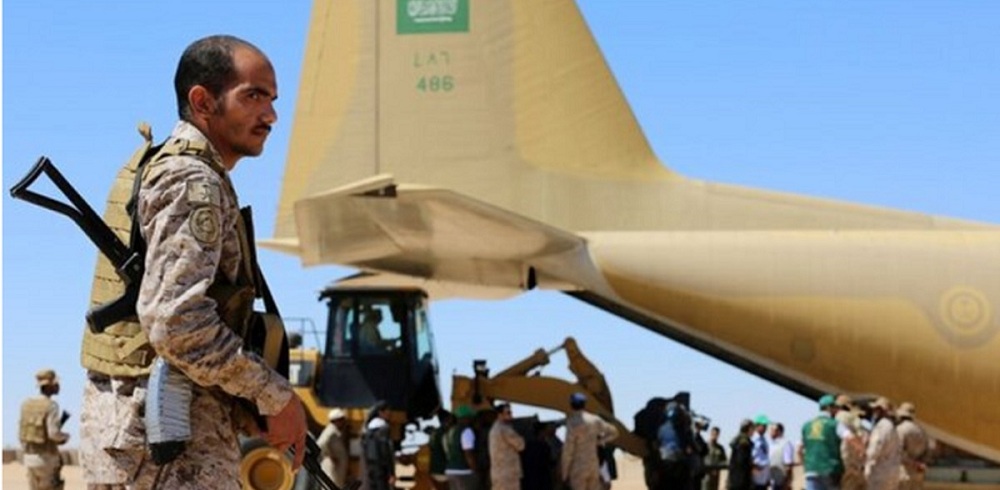Alwaght- Two years ago, Yemen’s Ansarullah movement started massive drone and missile strikes at Saudi Arabia under "deterrence operations", noticeably tipping the scales of war to Sana'a favor and hitting the psychological, political, and economic backbone of the aggression's war machine. And now carrying out the seventh round of these operations at Saturday night with 10 drones and 6 missiles— 1 Zolfiqar and 5 Badr– against Saudi oil giant Aramco's Al-Tanorah facilities in Damam and Jeddah have caused Riyadh and its Western allies to mobilize all their political and propagandistic resources to reverse losses.
On the one hand, the Saudis claim to have intercepted the incoming missiles and drones, but at the same time impose heavy censorship on media reports about the attack.
On the other hand, after breaking the news about the new Yemeni attack, US and British officials strongly condemned the attacks and announced their support for Riyadh. Even the British Foreign Secretary Dominic Raab in a speech in line with the desperate positions of the Saudis, without giving any evidence, claimed Iran's role in facilitating Sana'a attacks deep into Saudi territory.
First, these positions indicate that, contrary to Saudi efforts to prevent news leaks of Yemeni attacks on sensitive economic centers and facilities, deterrence operations, aimed at raising the cost of continuing the war for the Saudis and establishing a military balance and forcing Riyadh to scale down bombing Yemeni cities, have been quite successful and the Saudi side has done nothing despite spending billions of dollars to buy defense systems to repel retaliatory strikes.
In the meantime, pointing the finger of blame at Iran is a response to conceal Ansarullah's proven field superiority over the Saudi-led front and to rebuild the shattered morale of the Arab coalition forces and their Yemeni allies. The successful completion of seven rounds of deterrence operations by advanced drones and missiles capable of passing through the most advanced defense systems purchased from the US and other Western allies shows that Sana'a has achieved advanced military technology and defense independence, and that in the future Saudi Arabia will not see calm if it continues its atrocities against Yemeni civilians and infrastructures.
Second, the way Saudis and their allies reacted— mainly playing victim— seeks to invert the realities of war and change the place of the aggressor and the self-defending side.
The six-year invasion of Yemen by the Saudi-led coalition, in addition to destroying economic infrastructure and people's homes in the bombings, has killed tens of thousands of innocent people, including women, children, and the elderly, and displaced millions more. The continuation of the inhumane air, sea, and land siege of Yemen by the coalition and with the assistance of the West has caused a humanitarian crisis in this already-impoverished country to the extent that international organizations and the Sana'a government report a humanitarian catastrophe. But the Saudis are still not lifting the all-out blockade to allow in humanitarian aids, medicine, and food to the famine-stricken people.
"These condemnations have to be directed at the aggressors who keep their bombardment, shut down our ports and airports, and block fuel and medicine shipments to Yemen," said Yemeni Foreign Minister Hesham Sharaf of the American and British condemnation of Yemeni retaliation, adding: "These remarks are aimed at changing the rules of game in the front of the world and throwing the ball in Sana'a court; as if Sana'a is the aggressor and this cruel war starter."
But the political support thrown behind Riyadh and condemnation of Ansarullah by Washington and London is not irrelevant to recent regional developments, including the US fleeing from Afghanistan and abandoning their allied Kabul government in the face of the resurgent Taliban. Fleeing Afghanistan after two-decades of a war lost to a simply-armed insurgent group and also imminent withdrawal from Iraq have accelerated the pace of the American exit from the region— something badly sending Riyadh worried about losing Western backing. Last week, Khaled bin Salman, brother of Crown Prince Mohammed and deputy defense minister, signed a military cooperation agreement with Russia, sending a message about the future of alliance with the West and the degree of concerns about losing the Western support. Actually, whereas the American loss in Afghanistan proved uplifting to the Yemenis and disappointing to the Saudis who are increasingly concerned about what future bears for them in Yemen, Western countries desperately highlight their support to alleviate the Saudi rulers' worries.



























